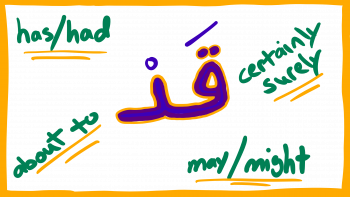The Meaning of “qad” قَدْ and How to Use it Posted by yasmine on Mar 27, 2019 in Arabic Language, Grammar
Last week, we looked at how to use ُحَيث and all its multiple meanings. This week, we’re looking at a two-letter-word “qad” قَدْ . Do not let the littleness of such tiny words deceive you ?, this word has an important grammatical function.
قَدْ must come before either a past or present tense verb. Depending on the case, قَدْ can have the following multiple meanings (had, has, may, might, about to, certainly, indeed, surely)
had and has
When قَدْ comes before a past tense verb, it makes the action more definite.
For example,
She went to school. Which translates to .ذهبت إلى المدرسة
Versus the sentence: She has/had gone to school.
Which translates to: .قد ذهبت إلى المدرسة
about to
When قَدْ comes before a past tense verb, it can also show that the action is about to occur.
For example, The game is about to begin. .قد بدأت المباراة
Be aware of context! ?
What would you say if the game has/had already begun?
Yup, same as above .قد بدأت المباراة only here, the meaning has changed due to context.
certainly/indeed/surely
When قَدْ comes before a past tense verb, it can also confirm or verify the action.
Let’s look at an example from the Quran: “قَدْ بَيَّنَّا لَكُمُ الْآيَاتِ إِنْ كُنْتُمْ تَعْقِلُونَ”
“We have certainly made clear to you the signs, if you will use reason.”
(Taken from Chapter (3) sūrat āl ʿim’rān (The Family of Imrān) Verse (3:118)).
may and might
When قَدْ comes before a present tense verb, it makes the action less definite.
For example, She is going to school. Which translates to .تذهب إلى المدرسة
She may/might go to school. .قد تذهب إلى المدرسة
Note: You may see لَقَد or فَقَدْ instead of قَدْ
لَقَد can only come before the past tense verb and it emphasizes the action.
For example: I went to school.
.لقد ذهبت إلى المدرسة
Using لَقَد here only emphasizes the fact that I went to school.
Here is another example from the Quran:
“لَقَدْ مَنَّ اللَّهُ عَلَى الْمُؤْمِنِينَ إِذْ بَعَثَ فِيهِمْ رَسُولًا مِنْ أَنْفُسِهِمْ”
“Certainly did Allah confer [great] favor upon the believers when He sent among them a Messenger from themselves.”
(Taken from Chapter (3) sūrat āl ʿim’rān (The Family of Imrān) Verse (3:164))
Sometimes قد can have a direct connection to the preceding sentence. When this is the case, قَدْ is usually preceded by فَ .
For example: Khalid did not want to return to this restaurant. He had eaten there before.
.لم يرد خالد أن يعود إلى هذا المطعم. فقد أكل هناك من قبل
Again, I hope you are finding these posts about using these “tiny” words useful. ?
More to come next week.
!سلام ?

Build vocabulary, practice pronunciation, and more with Transparent Language Online. Available anytime, anywhere, on any device.





Comments:
tom mullen:
Thank you for your posts–may I ask where you teach your Arabic Courses.
Thank you,
Tom
Kalim:
Hala Yasmine
I really appreciate your blogs and usually use them in teaching.
I’m teaching Arabic in public secondary schools in Mauritius ??
Ghani Senik:
The explaination and the examples given made me easier to understand how to use the kalimah قد
Lish:
مشاء الله… Yasmine you are the best?
Thank you for writing my other article request. This article is very meaningful to me?? Actually I have a very long list of questions, but I will wait until all of my previous questions are answered??
!سلام
Muddasir:
Hello yasmine
I am much more curious to know detailed information about the preposition عن
AKHMAD HUSNI:
THANK YOU